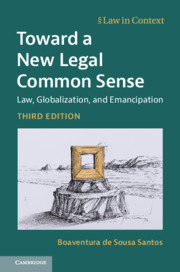Book contents
- Toward a New Legal Common Sense
- The Law in Context Series
- Toward a New Legal Common Sense
- Copyright page
- Dedication
- Contents
- Preface to the Third Edition
- Preface to the Second Edition
- Acknowledgements
- 1 The Tension between Regulation and Emancipation in Western Modernity and Its Demise
- 2 Toward an Oppositional Postmodern Understanding of Law
- 3 Legal Plurality and the Time-Spaces of Law: The Local, the National, and the Global
- 4 The Law of the Oppressed: The Construction and Reproduction of Legality in Pasargada
- 5 Globalization, Nation-States, and the Legal Field: From Legal Diaspora to Legal Ecumenism?
- 6 Law and Democracy: The Global Reform of Courts
- 7 On Modes of Production of Social Law and Social Power
- 8 Law: A Map of Misreading
- 9 Can Law Be Emancipatory?
- Postface as Disquietude
- Bibliography
- Index of Names
- Index of Subjects
9 - Can Law Be Emancipatory?
Published online by Cambridge University Press: 08 October 2020
- Toward a New Legal Common Sense
- The Law in Context Series
- Toward a New Legal Common Sense
- Copyright page
- Dedication
- Contents
- Preface to the Third Edition
- Preface to the Second Edition
- Acknowledgements
- 1 The Tension between Regulation and Emancipation in Western Modernity and Its Demise
- 2 Toward an Oppositional Postmodern Understanding of Law
- 3 Legal Plurality and the Time-Spaces of Law: The Local, the National, and the Global
- 4 The Law of the Oppressed: The Construction and Reproduction of Legality in Pasargada
- 5 Globalization, Nation-States, and the Legal Field: From Legal Diaspora to Legal Ecumenism?
- 6 Law and Democracy: The Global Reform of Courts
- 7 On Modes of Production of Social Law and Social Power
- 8 Law: A Map of Misreading
- 9 Can Law Be Emancipatory?
- Postface as Disquietude
- Bibliography
- Index of Names
- Index of Subjects
Summary
In Chapter Nine I attempt to answer the following question: Can Law Be Emancipatory? The answer takes into account the previous analyses, and aims to give political-juridical content to the oppositional postmodern conception of law. Drawing on examples of concrete political-juridical practices occurring in various parts of the world, I formulate the conditions for an emancipatory use of law. The set of these conditions and the practices into which they translate themselves, I designate as subaltern legal cosmopolitanism. This chapter was written under the logic of the sociology of emergences. My aim was to unfold the signs of the reconstruction of the tension between social regulation and social emancipation, as well as the role of law in such a reconstruction. The credibility of the signs was built on excavation work upon the foundations of the paradigm of modernity - a work that confirmed the exhaustion of the paradigm, while revealing as well the wealth and vastness of the social experience it rendered possible at the beginning, and later went on to discredit, marginalize or simply suppress.
Keywords
- Type
- Chapter
- Information
- Toward a New Legal Common SenseLaw, Globalization, and Emancipation, pp. 522 - 586Publisher: Cambridge University PressPrint publication year: 2020

